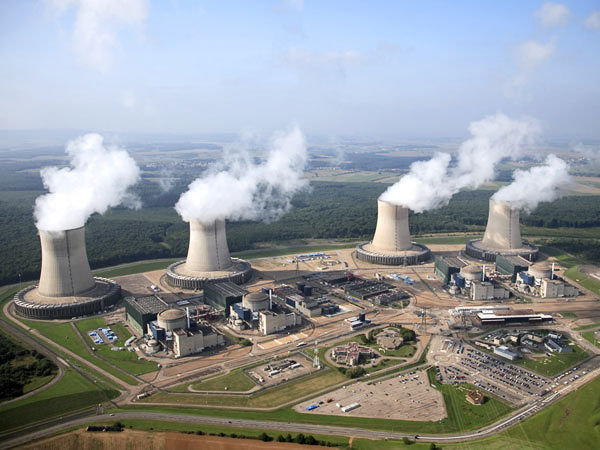 Cattenom Nuclear Power Plant;
Cattenom Nuclear Power Plant;
Luxembourg's Ministry of Energy and Spatial Planning and the Ministry of the Environment, Climate and Sustainable Development, along with the authorities in Rhineland-Palatinate and Saarland in Germany, have issued a joint press release on the subject of the Cattenom Nuclear Power Plant, located in the Grand Est region in France.
In this publication, Luxembourg, Rhineland-Palatinate and Saarland presented their study on security of supply in the region.
35 years after the Chernobyl disaster and another catastrophe in Fukushima, the European Union (EU) debate about increased funding for nuclear power has flared up again. Luxembourg, Rhineland-Palatinate and Saarland are directly affected by the danger of nuclear power plants in the neighbouring regions.
“That is why we are resolutely committed to the continued promotion of nuclear power, especially in our direct neighbours. It is clear to us that, in view of its unforeseeable consequences and dangers, nuclear power must finally be a thing of the past. No public funds may be made available to promote the expansion of nuclear energy. Germany shows the way for a highly modern and important industrial country to get out of nuclear power. Belgium is also planning to gradually phase out nuclear power", stated Carole Dieschbourg, Luxembourg's Minister of the Environment, Climate and Sustainable Development, Claude Turmes, Luxembourg's Minister of Energy, Anne Spiegel, Minister of State for the Environment, Energy, Food and Forests of Rhineland-Palatinate, and Anke Rehlinger, State Minister for Economic Affairs, Labour, Energy and Transport from Saarland.
In the context of the shutdown of nuclear power plants, the question of the resulting consequences for the security of supply is often asked. This question is a key issue in the energy sector. The ministers stressed that electricity not only has to be safe and clean, but also sufficiently available, as our energy supply will be electrified in many areas in the course of decarbonisation. They continued: "That is why we had a study carried out by an independent expert office to examine what consequences a closure of the Cattenom Nuclear Power Plant would have on security of supply".
They pointed out that the security of supply would be ensured even after the closure of the Cattenom Nuclear Power Plant and that it is also possible to retrofit the nuclear power plant, as shown by an assessment by the recognised, independent expert office in the field of security of supply, "Consentec". The experts concluded: "However, the security of supply issues do not stand in the way of decommissioning the Cattenom Nuclear Power Plant, as suitable remedial measures are technically known and are made available in a comparatively short time can".
In view of the well-integrated and adequately supplied Western European power supply network, no bottlenecks are to be expected. The experts also considered further use of machines in the non-hazardous part of the plant to be of benefit to the system: “One possibility would be to convert the machines in the non-nuclear part of the Cattenom power plant to so-called rotating phase shifters, as has already been done in Germany, for example, when the Biblis nuclear power plant was shut down".
The respective authorities emphasised that the Cattenom Nuclear Power Plant "must be taken off the grid", adding that "[e]xtending the term is unnecessary and completely unacceptable".
The French government plans to take several nuclear power plants off the grid in the coming years. The study presented on the security of supply showed that the Cattenom Nuclear Power Plant could be one of those plants to be shut down as a priority. The ministers confirmed that Luxembourg, Rhineland-Palatinate and Saarland will work in close coordination for this overdue step and take action against the planned extension of the operating life of the Cattenom Nuclear Power Plant beyond 40 years. In addition, the countries will work for complete transparency and participation.
The ministers recalled that renewable energies are safe and clean. They also guarantee climate protection and economic development in these regions and are becoming increasingly cheaper than nuclear power. They noted that they wished to jointly and increasingly promote the expansion of renewable energies in all areas so as to combine climate protection, security of supply and the protection of the population.








